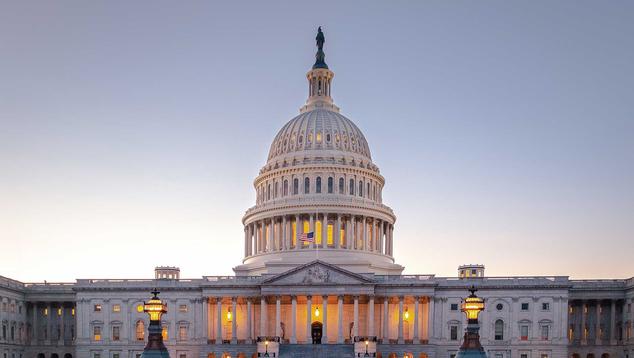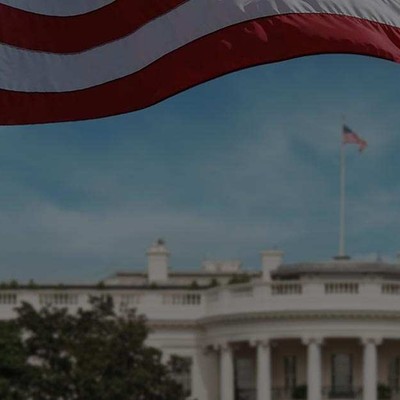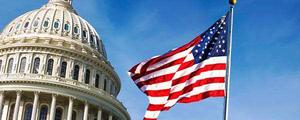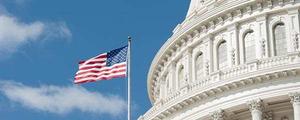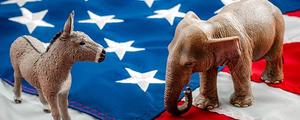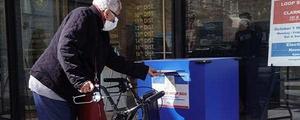We sometimes lose sight of the fact that the government itself is tied with the coronavirus as the most important problem facing the nation. This is not a new phenomenon. Across the first nine months of the year, mentions of the government as the nation's No. 1 problem have consistently put it near the top of the list, even amid the pandemic, racial tensions and economic turmoil.
In Gallup's September update, one in four Americans mentioned some aspect of the government when asked to name the most important problem. This reinforces -- at least to me -- the broad conclusion that the presidential candidates are missing the boat by not focusing more of their attention directly on the way our government functions (or doesn't function). Or, focusing more of their attention on the reasons for the negative perceptions of government, many of which can be tied to increasing polarization. I didn't hear a lot of discussion of government per se as a problem in the first presidential debate, and I didn't hear much in Wednesday's vice presidential debate either.
If I could brief the presidential candidates on the people's direction for fixing the government, what would I tell them? This is where it gets complicated. The more I look at the public's attitudes toward the government, the more I recognize how complex and nuanced they are. There are no simple answers. But it's worth the effort to highlight a few things we do know from recent public opinion polls.
Trust and Confidence in Government Remains Low
In addition to Americans' mentions of government as the nation's top problem, research shows there are other negative associations with government. For one thing, the federal government has the dubious honor of being dead last in Gallup's annual listing of Americans' evaluations of 25 business and industry sectors. Half of Americans have "somewhat negative" or "very negative" ratings of the federal government, the highest combined percentage for any of the 25 sectors tested (another 20% give "neutral" ratings, and 30% offer "somewhat positive" or "very positive" ratings).
The people also have relatively little trust and confidence in the federal government to handle domestic problems, although they are a little more trusting of the government's ability to handle international affairs. As my colleague Lydia Saad put it in her review of these data: "As the country is engaged in critical efforts to combat the medical, economic and societal effects of the global coronavirus pandemic, Americans' trust in the federal government to handle domestic issues is near its lowest point in Gallup trends since 1972."
Despite these broadly negative reactions to government, however, Americans are actually positive about some specific functions of the government when we get down to particulars. Social Security, one of the government's biggest expenditures, is critically important for many older Americans, and we rarely see it crop up as a perceived problem. Indeed, if there is a concern about Social Security, it is the worry that it will go away. We also know that the military -- the government's biggest discretionary budget item -- is very highly regarded by Americans.
An interesting Pew Research study recently confirmed the degree to which Americans can differentiate when asked to evaluate government functions. Americans are more positive than negative about the way the government handles keeping us safe from terrorism, responding to natural disasters, keeping food and medicine safe, strengthening the economy, and maintaining infrastructure. But the public gives "underwater" ratings -- that is, a higher percentage say the government is doing a bad job than doing a good job -- to five other areas: managing the U.S. immigration system, helping people get out of poverty, handling threats to public health, protecting the environment and ensuring access to healthcare.
On the issue of handling threats to public health, additionally, almost all polling I have seen shows that Americans rate the federal government's response to the COVID-19 virus negatively.
The point here is that Americans' views of the government's performance are quite nuanced when we get down to specifics. Americans appreciate a number of things their government does for them, even while dinging the institution as a whole.
Government Doing Too Much?
Americans' attitudes are similarly complex when it comes to specific questions about the degree to which the government should be involved in our daily lives. For example, despite the fact that government is tied as the most important problem facing the nation and that Americans report low confidence in their government, Americans increasingly feel that the federal government should be doing more, not less.
Gallup's Megan Brenan recently summarized our latest findings: "For the first time in Gallup's 28-year trend, a majority of Americans think the government should do more to solve the nation's problems. … The public's desire for more government has increased seven percentage points since last year."
Specifically, 54% of Americans say they want the government to do more to solve our country's problems, compared with 41% who say the government is trying to do too many things that should be left to individuals and businesses. The only other time the "government doing too much" percentage dropped to as low as 41% was shortly after 9/11.
But of course, even with the significant tilt toward the "government should do more" side of the ledger, as can be seen, four in 10 Americans remain convinced that the government is doing too much. In short, the appropriate role of government remains a divisive issue.
The Pew Research study referenced previously shows that Americans can also make distinctions when asked about the government's role in taking on specific issues and problems. Asked to rate the role that the government should play in 10 different policy areas, the public's responses ranged from a high of 91% who want the government to play a major role in keeping the country safe from terrorism to a low of 62% who want the government to play a major role in helping people get out of poverty. Other areas where more than eight in 10 want the government to play a major role include responding to natural disasters, ensuring that food and medicine are safe, and managing the nation's immigration system.
Remarkably, despite these differences across issues, a significant majority of Americans say that the government should have a major role in every area that Pew tested.
The conclusion here, again, is that Americans exhibit somewhat paradoxical (i.e., complicated) views about government. They tend to see the way the government works as a major problem facing the nation, they evaluate the government negatively, and they express little confidence in the government's broad ability to address domestic issues. Yet, Americans increasingly say the government should do more to solve, and take on a major role in addressing, the nation's problems.
Bottom Line
So, back to the original question. If we can channel the attitudes of the American people, what would be their best advice to our current presidential candidates concerning the problem of government itself?
We know that solutions to the nation's problems, as I've reviewed here, are complex. There are no simple fixes. There is no agreement that the government should either intervene and take on the challenge of solving all of Americans' problems, or that the government should stand down and leave problem-solving to individuals and businesses. Americans don't particularly respect the federal government, even while recognizing that it can do a good job in some areas and that it should be doing a good job in most areas.
Thus, the top directive from the American people to their leaders, it seems, would be to clean up their own house and conduct themselves with a focus on compromise and problem solution rather than ideological rigidity.
Moderator Susan Page at the vice presidential debate on Wednesday passed on to the two candidates a telling question posed by a Utah eighth-grader: "When I watch the news, all I see is arguing between Democrats and Republicans. When I watch the news, all I see is citizen fighting against citizen. When I watch the news, all I see are two candidates from opposing parties trying to tear each other down. If our leaders can't get along, how are the citizens supposed to get along?"
Good question, indeed. In fact, this hyper-polarization facing the nation may be part of the reason for the public's overall low trust in government to solve problems. Partisans on the "outs" -- that is, those who identify with the party not controlling the White House -- find it difficult to be positive in responding to broad questions about the government. But these differences become less salient when Americans are asked to drill down to specifics.
Big-picture issues remain. The people of this country want their leaders to focus on finding the correct level of government intervention in efforts to solve the nation's problems, one by one, and to figure out ways of improving positive outcomes when the government focuses on specific problems. But, as the young student noted, it's obviously impossible for the major problems facing the nation to be addressed in all of their complexity if elected representatives, for whom Americans generally have little respect, can't get along. Differences of opinion are built into our political system, as we know. But from the public's views, these differences, and the ideological rigidity that goes with them, can get out of hand. Leaders need to focus on the process by which they govern in order to find solutions to the substance of the problems we all face, as exemplified by the passing of the initial stimulus plan when the coronavirus first swept through the nation.
